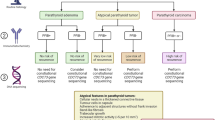Abstract
For clinically localized prostate cancer, recent studies strongly indicate that the determination of p53 inactivation allows the identification of a highly aggressive subgroup of prostatic tumors associated with decreased recurrence-free and long-term survival following radical prostatectomy. However, several questions regarding the determination of p53 alterations in prostate cancer, such as the poor correlation between immunohistochemistry and molecular genetic analysis, remain to be clarified. On the DNA level, p53 gene alterations have been identified in only up to 64% of tumors exhibiting immunohistochemically detected overexpression of the p53 oncoprotein. This discrepancy can be explained either by the genetic microheterogeneity of prostate cancer or by stabilization of the wild-type protein due to posttranslational events. In the present study we tried to determine the concordance between an immunohistochemically detected p53 overexpression and the result of molecular genetic analysis. Therefore, tumor tissue obtained by microdissection from 40 prostate cancer specimens was subjected to DNA-sequence analysis. Microdissection was based either only on histopathologic criteria or on the result of the immunohistochemical staining reaction. In 8 of 14 (57%) tumors a positive immunohistochemical reaction could be confirmed by DNA sequencing, which revealed a missense point mutation at the p53 gene locus, mainly in the form of G → A transversion in exon 5 of the p53 gene. Following the micropreparation of tumor cells exhibiting p53 oncoprotein overexpression, missense point mutation could be detected in an additional 4 cases. Following a microscopically guided tumor cell dissection according to the result of immunohistochemistry, DNA sequencing confirmed an immunohistochemically detected p53 overexpression in 86% of cases investigated. This result indicates that a microdissectional tumor cell preparation is recommended for molecular genetic analysis of histologically heterogeneous tissue specimens such as prostate cancer and should be performed according to and in addition to the result of immunohistochemistry when an immunohistochemical approach is available.
Similar content being viewed by others
Author information
Authors and Affiliations
Rights and permissions
About this article
Cite this article
Kuczyk, M., Serth, J., Bokemeyer, C. et al. The need for microdissectional tumor cell preparation during the molecular genetic analysis of prostate cancer. World J Urol 17, 115–122 (1999). https://doi.org/10.1007/s003450050116
Issue Date:
DOI: https://doi.org/10.1007/s003450050116




